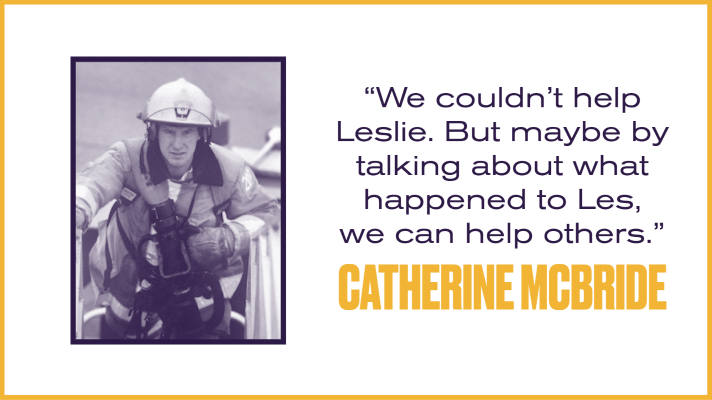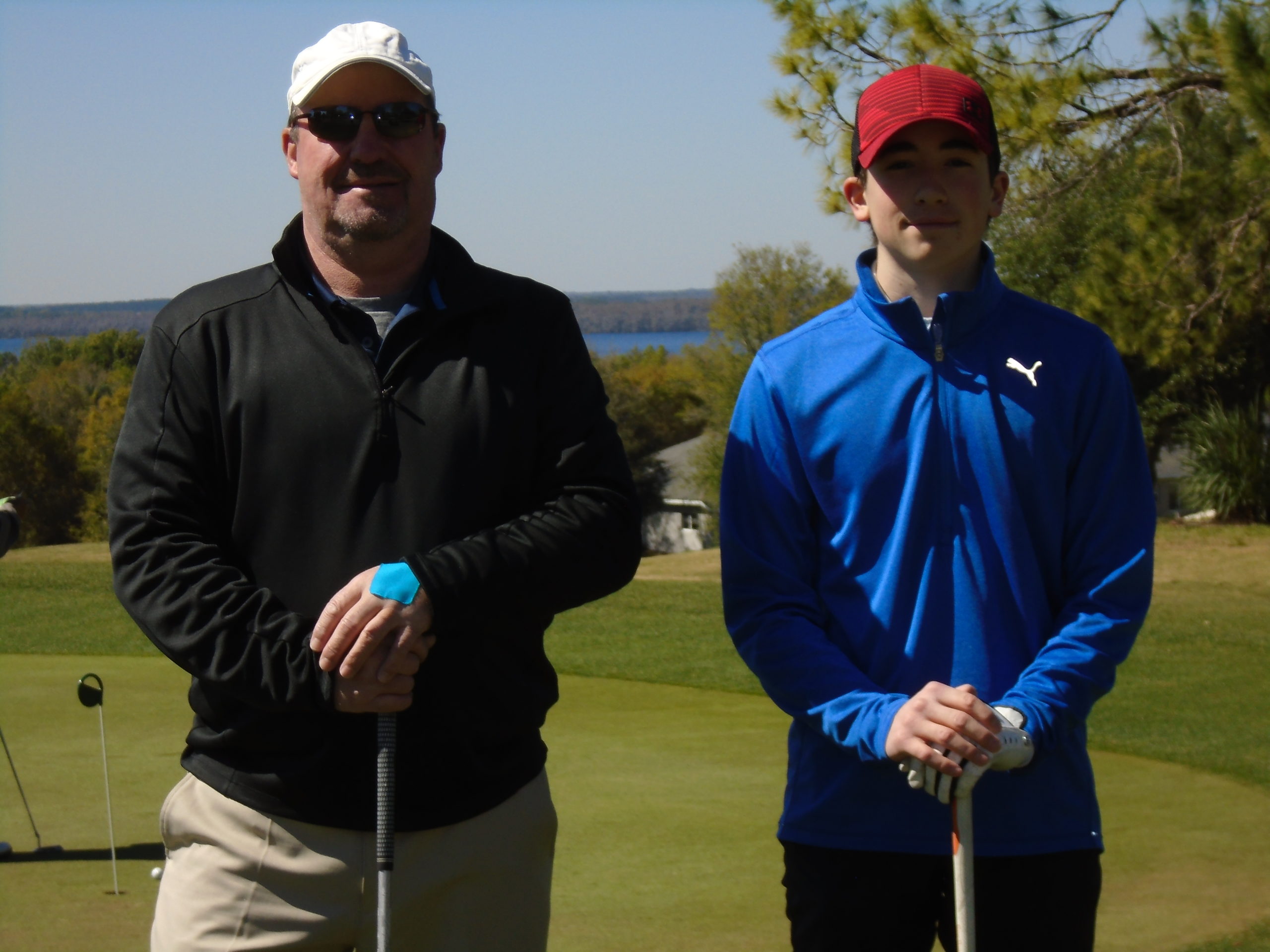Catherine McBride Shares Her Husband’s Experience with Pancreatic Cancer and The Increased Risk Faced by Firefighters
Les’s Journey
Leslie McBride first experienced symptoms of pancreatic cancer in May 2018. As Captain of the Ottawa Fire Department, physical exhaustion was not an unheard-of side effect of the job. He was also an avid sportsman who could often be spotted on the golf course with his fellow firefighter colleagues.
“For 20 years, that was his passion,” Leslie’s wife of 32 years, Catherine, explained. He even instilled a love of golf in his son, Jakob, from an early age. “When Jake came along, Leslie took him to the golf course and driving ranges.” Given his active lifestyle, it was not immediately clear to the McBrides that Leslie’s condition would only continue to worsen.

“The doctors never put two and two together,” said Catherine. By January 2019, signs of jaundice were undeniable as his eyes became noticeably yellow.
It was only because of Catherine’s continued advocacy that he was diagnosed nine months after his first symptoms appeared. An emergency room visit for a suspected gallbladder attack ultimately led to his pancreatic cancer diagnosis in February 2019. The attending doctor gave him a life expectancy of only 18 months, yet Catherine was determined to change her husband’s fate.
“When he was diagnosed, none of us really knew what pancreatic cancer was. Right then Alex Trebek’s pancreatic cancer was in the news, and we thought he was doing well and at one point declared he was in remission,” said Catherine. “If he can get the right treatments, why can’t we get it? This ultimately provided us with false hope.”
The Importance of Patient Empowerment
Leslie’s diagnosis came with the unfortunate news of a small but inoperable tumour, given its placement on an artery. This only provided further motivation for Catherine to search for second opinions. Though her efforts were constantly dismissed, she would not be deterred.
“We were thrown a pamphlet in oncology, but it didn’t really do anything,” she explained. “I was used to networking to find answers. I had to go and find trials. I had a file folder of different trials all over the world, but my research was passed off.” Even at the height of the COVID-19 pandemic when Canadian healthcare systems were struggling the most, Catherine continued to advocate for her husband’s care and quality of life.
“You have to be a pain in the ass. I kept having the door shut on me,” she explained. “Even when he was in the hospital his doctor called me, asking what he was in the hospital for. There is such a disconnect in our healthcare system.” Eventually, an aggressive round of chemotherapy and radiation allowed Les to regain his energy and return home to Catherine and Jakob. Unfortunately, by October 2020, another hospital visit in a strained healthcare system revealed several gaps in care that continue to negatively impact cancer patients and their loved ones.
“Leslie called to say that they left him a hallway, it was just awful,” said Catherine. She raised her concerns with the director of oncology and nursing staff which went unresolved in the height of the pandemic. This difficult experience ultimately led to the decision to end his treatment. It was then that the McBride family sought out hospice care.
Les McBride and his son Jakob
Finding Care and Comfort
The McBrides found the hospice environment to be much more supportive and responsive to Leslie’s needs. Compared to the hospital where visits were limited to two family members for only one hour each day, this new setting provided a higher level of personalized care while still having preventative COVID-19 measurements in place. Catherine explained that hospice care felt much more compassionate, and the staff were more attentive to Leslie’s medical needs, even making efforts to honour his long-time love of golf.
“The hospice was a beautiful facility and they had golf on the tv for him. The care there was amazing compared to the hospital during COVID,” explained Catherine.
“My son grew up really fast. He decided not to go out of town to university but stay close to home.,” said Catherine. She also took a six month leave from work to be by Leslie’s side. Neighbors and extended family also stepped in to help where they could. As Leslie neared the end of his life, pain management and comfort were of the utmost importance.
“Staff were more supportive in hospice. In hospital they talked about end of life without much compassion, but at the hospice it was very personal,” said Catherine. The goal was not to prolong his life, but rather to make it easier on him until his passing on October 15, 2020. Looking back on the experience, Catherine only hopes others won’t have to endure the same fate, particularly those who shared Leslie’s career path in firefighting.
A Workplace Hazard
The early days of Leslie’s firefighting career were during a time when masks were not a requirement. At the time of his diagnosis, it was known that there are a number of cancer risks associated with firefighting. While certain cancers are provincially acknowledged as being an elevated risk for firefighters, Ontario has not yet joined British Columbia, Nova Scotia, Manitoba and Yukon in adding pancreatic cancer to that list. This means that for families like Catherine’s, they are not entitled to the benefits provided to families when a firefighter develops this disease as a result of their service. As Catherine saw more of Leslie’s colleagues face their own cancer battles, she became motivated to open a case with the union on Leslie’s behalf.
“We know there has to be some connection between pancreatic cancer and firefighting,” said Catherine. Unfortunately, determining this link has been increasingly difficult given the lack of reporting that occurs on the job. At one point Catherine was given the impossible task of pinpointing which fire caused Leslie’s cancer for the case to be considered by the WSIB.
“Fire services didn’t take those stats, they don’t even know which fires he was at; there’s no record. No one wants to put the effort into it.” Even though her case was quickly rejected, Catherine continues to be a fierce advocate for firefighters to be aware of the cancer risks that may arise from the job.
“Many cancers are covered in Ontario, but not pancreatic,” said Catherine. She hopes that by sharing Leslie’s story, firefighters and their families will recognize the signs and symptoms of pancreatic cancer, receive the appropriate supports, and ultimately survive this disease.
“We couldn’t help Leslie. But maybe by talking about what happened to Les, we can help others.”
PCC stands alongside the McBride family, and all firefighters across Canada, as we advocate for the health and wellbeing of first responders. Not only are we raising awareness about this devastating work-related health risk and educating individuals about the signs and symptoms, we are actively working to ensure support and resources are available in the event of a diagnosis.
Coverage for pancreatic cancer varies from province to province; British Columbia, Nova Scotia, Manitoba and Yukon are currently the only provinces and territories that include it on the list of presumptive diseases firefighters may develop. We recognize updated coverage for all Canadians firefighters is direly needed and have partnered with firefighting associations across the country to build the appropriate framework. These efforts include meeting with provincial government officials to advocate for this devastating disease being recognized as a valid risk to firefighters and speaking at health and safety seminars so firefighters are aware of their risk.
Learn about Bill C-224
We continue to follow the progress of Bill C-224, which aims to create a national framework forthe prevention and treatment of cancers linked to firefighting.


Recent Comments